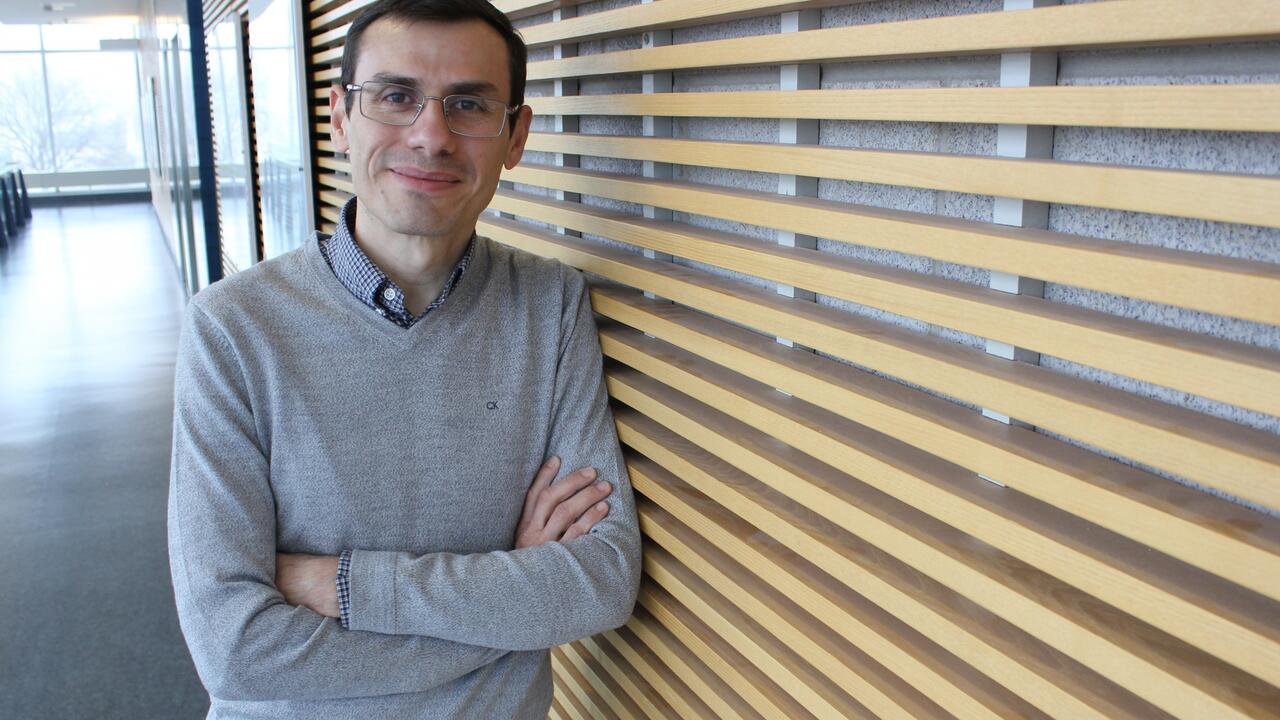
On a mission to recruit grad students
Chemical engineering professor Luis Ricardez-Sandoval wants to ensure ambitious graduate students in his homeland of Mexico know more about the opportunities at Waterloo Engineering than he originally did

Chemical engineering professor Luis Ricardez-Sandoval wants to ensure ambitious graduate students in his homeland of Mexico know more about the opportunities at Waterloo Engineering than he originally did
By Brian Caldwell Faculty of EngineeringLuis Ricardez-Sandoval didn’t have to think about it for long when he was asked to represent the University of Waterloo on a tour to recruit graduate students in his native Mexico.
After coming to Waterloo to earn his PhD, then staying to teach, do research and raise a family here, the chemical engineering professor was raring to put his personal experience and genuine enthusiasm to good use.
“I feel very honoured to belong to this university,” says Ricardez-Sandoval, whose research is focused on computer modelling, simulation and optimization of chemical processes, including carbon dioxide (CO2) capture technologies to reduce greenhouse gas emissions from coal-fired power plants.
“I really love the environment here, otherwise I wouldn’t be doing this.”
How he found his own way to Waterloo is a big part of the reason he signed on in late March for his second trip with CALDO, a consortium of leading Canadian research universities dedicated to forging partnerships in Latin America.
After earning undergraduate and master’s degrees in Mexico, Ricardez-Sandoval worked for several years in industry before deciding to pursue a doctorate abroad.
Canada appealed to him because of its ethnic diversity and reputation for welcoming newcomers, something he confirmed by listening to all the languages spoken on the streets of Toronto while he was visiting friends there.
Still, he knew next to nothing about Waterloo when he landed almost by chance on the websites of professors Hector Budman and Peter Douglas, international experts in the field he wanted to study.
Ricardez-Sandoval jumped at an opportunity to work with Budman and Douglas without realizing Waterloo is one of the top 50 engineering schools in the world with leading-edge research taking place all across the campus.
While settling in, he was also impressed by the overall quality of life in Waterloo, a community with a small-town feel, but all the services of a big city, located just an hour from Toronto and a couple of hours from the U.S.
A dozen years later, Ricardez-Sandoval is eager to ensure ambitious graduate students in his homeland know a lot more about the opportunities in Waterloo than he originally did.
He goes through hundreds of business cards on the tours, steers those who later contact him in the right directions and was recently featured in Reforma, a national newspaper based in Mexico City, touting the benefits of working and studying in Waterloo.
“It’s not that they don’t want to come here, it’s that they don’t have the information,” Ricardez-Sandoval says. “Some of them don’t even know where Waterloo is located.”
Ricardez-Sandoval figures his own journey here gives him an edge as a recruiter, as do his fluent Spanish and understanding of regional differences in Mexico.
“My experience has been so enjoyable that I want my peers in Mexico to realize how great we are,” he says. “That is the message – look further north.”

Read more
How Doug Kavanagh’s software engineering degree laid the foundation for a thriving career in patient care

Read more
Upside Robotics secures new funding to accelerate the future of sustainable farming

Read more
Redefining capstone learning by bringing students, faculty and community partners together to tackle real-world challenges
The University of Waterloo acknowledges that much of our work takes place on the traditional territory of the Neutral, Anishinaabeg, and Haudenosaunee peoples. Our main campus is situated on the Haldimand Tract, the land granted to the Six Nations that includes six miles on each side of the Grand River. Our active work toward reconciliation takes place across our campuses through research, learning, teaching, and community building, and is co-ordinated within the Office of Indigenous Relations.